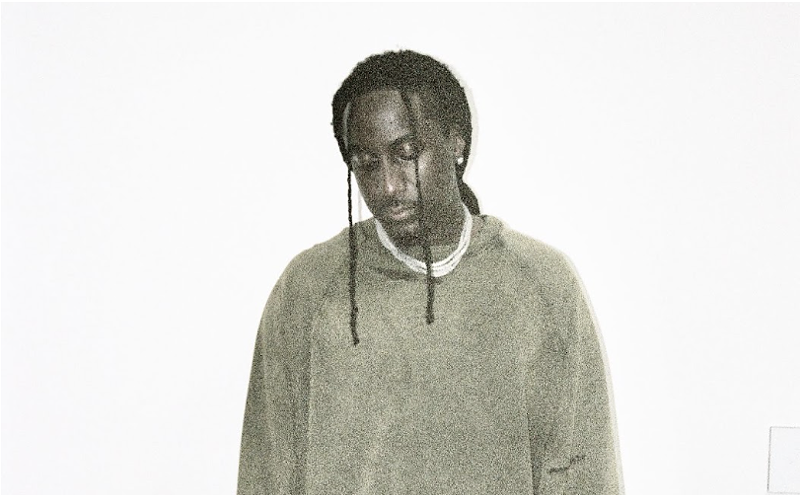Sturgill Simpson never said he was a country artist. In fact, he's long insisted that he isn't. Proclaimed the savior of country music ever since the release of 2014's Metamodern Sounds in Country Music, Simpson’s always been a moving target, an artist whose mind moves in so many different directions that he’s impossible to pin down. Which is why no one should be surprised by the sonic shift heard on "Brace for Impact (Live a Little)," the first single from Simpson's long-awaited follow-up, which debuted on iTunes last week.
Predicting what Simpson’s next album would be like has been about like betting on cat racing: There are just too many factors to make an informed decision. After all, one can’t necessarily count on the guy who pens odes to psilocybin mushrooms, LSD and reptile aliens to be regular when it comes to releasing new material. But after more than a year of waiting, A Sailor's Guide to Earth, his third full-length solo release, is unlike any he's made before. It might not exactly be easy to classify this album, but it's definitely not strictly country.
Not that the signs of reinvention weren't already there. Earlier this month, HBO debuted “Sugar Daddy,” Simpson’s first new track since Metamodern and the theme to the '70s rock-inspired, Martin Scorsese and Mick Jagger-produced series Vinyl. With just that one track, Simpson offered an entirely new sound, a sultry Southern rock aesthetic.
For A Sailor's Guide, Simpson made lots of risky choices that go beyond the decision to stray away from hard country. Instead of going with Dave Cobb, the genius who’s created a whole lineage of new country artists, Simpson chose to self-produce the album. In the iTunes interview that premiered “Brace For Impact (Live a Little),” Simpson acknowledged those risks, admitting that he remains scared that all his fans are going to ditch him and go back to whoever the hell they were listening to before.
And it is different, that’s for sure, but it ain’t at all bad. The new Simpson sound is much more influenced by the sounds of Southern rock, though some psychedelic elements linger. “Sugar Daddy” is a bit of an outlier, difficult to evaluate in the context of the album – largely because it’s not on the album – but it did indicate that Simpson may not be the artist we all thought he was.
Simpson is the kind of guy who’s good at convincing folks to go along with a crazy-ass idea — like, say, making country music that makes you want to drop acid — someone who isn't going to be hindered artistically by fears that his fans won't appreciate the next evolution. Country fans are a finicky crowd, though, especially those who are picky enough to designate Simpson as one of the genre’s few artistically pure players.
Simpson, in his view, clearly exists in a vacuum. He's not set out to reinvent the wheel or save us all from a self-created hell of listening to terrible country music. He is an outlier, someone who comes along every couple of years and makes you entirely rethink everything that he's done before. No one would've predicted after High Top Mountain, an arguably straightforward traditional country album, that he'd veer into the alien turtle territory of Metamodern.
He did, of course, and it was an improbable success, one that clearly pushed Simpson to dig deeper into his own artistic values. This isn't an album intended to pander to fans who happily sup up whatever garbage Nashville presents to them, it's a screenshot that attempts to capture an artist's evolution. And that evolution clearly doesn't involve being a part of country music's future.
But the fundamental difference between Metamodern and Sailor’s Guide is Simpson's swagger. A year of personal and career success has given Simpson, who was no doubt entirely beaten down by the experience of trying to get a country record on the charts, a remarkable new confidence. Instead of the sleepy, world-weary philosopher heard on “Life of Sin” and Simpson’s cover of “The Promise,” Sailor’s Guide is a confident collection of well-traveled advice.
Which is why it is so fascinating to consider this new album and its disparate sound in the context of Simpson’s meteoric rise to fame. It would’ve been easy enough for Simpson to stick with the same hard-country format, largely because there are plenty of people who are outright begging for that sound. But Simpson diverted away so starkly that it’s hard to say that Sailor’s Guide is even a country album. There are elements to be sure, like Simpson’s twang and the occasional subtle fan service, but this is a release that exemplifies Simpson’s effortless transcendence of the genres.
The transformation is stark — you really can hear that confidence in Simpson’s voice — and it’s impossible to not revel in that just a little bit. He’s found his footing, as a man, as a father and as an artist, and that’s a pretty exciting thing to watch. If Metamodern was Simpson’s middle finger to the traditional country establishment, Sailor’s Guide is only going to rub dirt in the wound.
The rock influence that permeates A Sailor’s Guide to Earth will not be well-received by some country fans, who may have already felt slighted by Simpson’s constant insistence that he is not part of their beloved genre. But if the mere presence of a hard-country aesthetic is all that you liked about this artist who has already shown himself to be well-rounded and immensely thoughtful, you’ve entirely missed what makes Sturgill Simpson such a remarkable artist.

Audio By Carbonatix
[
{
"name": "GPT - Billboard - Slot Inline - Content - Labeled - No Desktop",
"component": "21721571",
"insertPoint": "2",
"requiredCountToDisplay": "2"
},{
"name": "STN Player - Float - Mobile Only ",
"component": "21861991",
"insertPoint": "2",
"requiredCountToDisplay": "2"
},{
"name": "Editor Picks",
"component": "17105533",
"insertPoint": "4",
"requiredCountToDisplay": "1"
},{
"name": "Inline Links",
"component": "18349797",
"insertPoint": "8th",
"startingPoint": 8,
"requiredCountToDisplay": "7",
"maxInsertions": 25
},{
"name": "GPT - 2x Rectangles Desktop, Tower on Mobile - Labeled",
"component": "22608066",
"insertPoint": "8th",
"startingPoint": 8,
"requiredCountToDisplay": "7",
"maxInsertions": 25
},{
"name": "Inline Links",
"component": "18349797",
"insertPoint": "8th",
"startingPoint": 12,
"requiredCountToDisplay": "11",
"maxInsertions": 25
},{
"name": "GPT - Leaderboard to Tower - Slot Auto-select - Labeled",
"component": "17357520",
"insertPoint": "8th",
"startingPoint": 12,
"requiredCountToDisplay": "11",
"maxInsertions": 25
}
]











